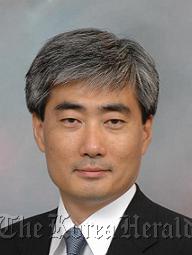Greece’s exit from eurozone a matter of time: expert
By Korea HeraldPublished : June 14, 2012 - 20:27
Shin Hyun-song, Princeton University professor and former advisor to President Lee Myung-bak on international economy, said Thursday that Greece’s exit from the eurozone was a matter of time.
“We don’t know whether it will be determined by the Greek election this weekend or later, but since there is a fundamental contradiction, it can’t keep going,” Shin told reporters at the Bank of Korea.
“We don’t know the timing or the level of support Greece will get from other EU countries, but if the contagion effect of its pullout on other financial markets is contained, there won’t be major repercussions.”
Shin noted, however, that the situation in Italy raises bigger concerns as many Italian banks have expanded to Eastern Europe and the country’s debt-to-GDP ratio has risen above 120 percent.
If Spain falls into a crisis, there is a high chance of Italy joining, he said.
“Other than Greece, which is in a fiscal predicament, the eurozone quandary is fundamentally a crisis of capital outflow,” Shin said.
“The cross-border capital flow in the banking sector that rapidly increased since the birth of the euro heated up property markets in Ireland and Spain, but the money is now flowing out of these countries, making banks insolvent. Spanish and Irish banks will undergo restructuring within a year or two,” he said.
“We don’t know whether it will be determined by the Greek election this weekend or later, but since there is a fundamental contradiction, it can’t keep going,” Shin told reporters at the Bank of Korea.
“We don’t know the timing or the level of support Greece will get from other EU countries, but if the contagion effect of its pullout on other financial markets is contained, there won’t be major repercussions.”
Shin noted, however, that the situation in Italy raises bigger concerns as many Italian banks have expanded to Eastern Europe and the country’s debt-to-GDP ratio has risen above 120 percent.
If Spain falls into a crisis, there is a high chance of Italy joining, he said.
“Other than Greece, which is in a fiscal predicament, the eurozone quandary is fundamentally a crisis of capital outflow,” Shin said.
“The cross-border capital flow in the banking sector that rapidly increased since the birth of the euro heated up property markets in Ireland and Spain, but the money is now flowing out of these countries, making banks insolvent. Spanish and Irish banks will undergo restructuring within a year or two,” he said.

Introducing Eurobonds can solve fiscal problems but not the capital outflow crisis, and the recently announced indirect bailout of Spanish banks through the Spanish government would increase the country’s debts, he said.
The European Central Bank would not let a liquidity crisis take place, but there is a high chance of a long-term quandary of toxic assets like what was seen in Japan, according to the economics professor.
“Having suffered from deleveraging by European banks after the 2008 financial crisis, Korea has built on its macroprudential policies to withstand financial shocks, but it needs to brace for a blow on the real economy,” Shin said.
“Korea’s household debts, which are a product of excess liquidity, are likely to decline as the liquidity is collected.”
Now is a time the BOK should lower the benchmark interest rate as higher rates could inflate liquidity when other countries are implementing quantitative easing through zero interest rates, he added.
Shin was in Seoul to give a keynote speech at the Bank of Korea’s annual international conference themed “Monetary and Macroprudential Policies in the Aftermath of the Crisis.”
He said during his speech that financial stability cannot be achieved solely through monetary policy.
“Additional macroprudential measures must be employed,” he said. “Korea’s ‘Triple Set’ of macroprudential policies is an example of such complementary measures.”
By Kim So-hyun (sophie@heraldcorp.com)
-
Articles by Korea Herald



![[KH Explains] Hyundai Motor’s plan for new landmark keeps hitting bumps](http://res.heraldm.com/phpwas/restmb_idxmake.php?idx=644&simg=/content/image/2024/05/13/20240513050626_0.jpg&u=20240513192803)
![[Grace Kao] American racism against Stray Kids](http://res.heraldm.com/phpwas/restmb_idxmake.php?idx=644&simg=/content/image/2024/05/13/20240513050827_0.jpg&u=)














